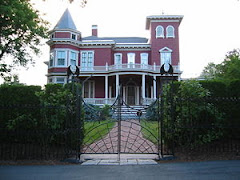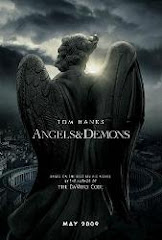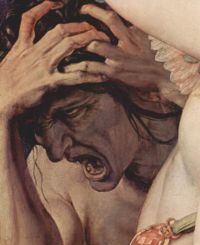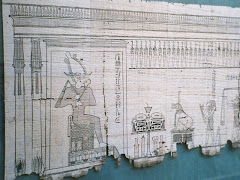Wednesday, July 15, 2009
A Short Story and (Bad) Love Poetry
Some people have read this before. But I just thought of posting it. Written circa junior year in HS, it happened to fit a CW requirement. :)
The night was cold as the wind rattled through the rafters and shingles of the houses near London’s East End. During days of trade or days of worship, the town turned into a restless marketplace with people of all professions and predilections. Nights, however, were almost deafeningly silent. The year was 1888, and it was the seventh day of August. The moon was full and bright, its beams illuminating the deserted cobble-stone streets. A lone wild bird circled stealthily overhead. The last of the panhandlers have retreated into the recesses of the side streets. It seemed an ordinary night, like any other night in England… but, as the clock struck twelve, a bloodcurdling scream resounded in the cold air. Then, as abruptly as it started, the scream faded back into the silence.
They found her body the next day, sprawled on the stairs of an inn called the Whitechapel. Her throat was slashed; her blood pooled around her like a macabre shroud. Her face was unrecognizable with the post-mortem swelling of the soft tissue. The bones of her nose were broken in perhaps three places; the side of her head was obtrusively caved in. But the sadism did not stop there—her belly was cut open with the precision of a surgeon’s scalpel. Her innards were exposed, yet her kidney was nowhere to be found. Stab wounds ran the length of her body, and, where there was no blood, there were bruises and horrible welts. It was without doubt the work of a bestial, merciless killer.
She was identified as Martha Turner, a scarlet woman. The police started an investigation right away… but it was all in vain. They could not find the cold-hearted murderer, and there were no witnesses. Day after day, the police combed the streets hoping to catch a glimpse of the man who bestowed such a grisly death to the unfortunate victim.
Or, at least they thought there were no witnesses. Someone saw everything… Actually, I saw everything. I watched as her throat was ripped open, I saw her struggling and begging for mercy. I was the one who gazed upon her futile attempts to escape the clutches of death. How, you ask? Because I was holding the knife that snatched her pathetic life away. I dragged her into her death… I did society a favor! I savored the moment that the light was extinguished from her helpless green eyes. I felt exhilaration as her ravaged soul escaped into the gloomy, gelid air, as only an angel of death could. Women like her do not deserve to live… They are the breeders of pestilence! They pollute civilization with displays of immorality... They are the unchaste, the unclean... they show no respect for themselves... and for what? Is it not to no avail? Surely, you must agree with my quest to purify the earth of worthless, libertine scum? Oh, je suis desolée, I almost forgot to say... my name is Jack the Ripper, and on that fateful night of August, I committed my first murder.
(Poetry Attempt 2. She should really stop making us write love poems. I suck, bigtime.)
In the chapel of my sacred art
The stage is black, one spotlight bare
The singer stands in the smoky beam
No other leaps to join her there.
The trombone leads the prelude’s note
The piano peals, Do-Re-Mi-Do
Her voice follows but falls short
The rhythm is lost on the soprano.
The chorus chants, their notes move
She looks up and tears at fugue
She sings the aria, strains her voice
She is a baffled ingénue.
Fast forward past the interlude
Tenor appears, out of tune
He hits a sharp, she sings furioso
The critic writes “Sang too soon.”
Second interlude, he offers a rose
Neglects to remove the sharp thorn
Her finger bleeds, the petals fly
The score pities not the forlorn.
Climax unfolds, neither understands
Sense fades from the libretto
The violin cries, the clarinet gasps
Two voices reach their false-etto.
The climax passes, tragedy done
The onlookers gaze on, upset
They try to make the most of when
Two solos do not make a duet.
The cello weeps, the snare drum sobs
The coda does Do-Re-Do-Mi-Do
The singers exit, voices asunder
As their hearts let the opera go.
The night was cold as the wind rattled through the rafters and shingles of the houses near London’s East End. During days of trade or days of worship, the town turned into a restless marketplace with people of all professions and predilections. Nights, however, were almost deafeningly silent. The year was 1888, and it was the seventh day of August. The moon was full and bright, its beams illuminating the deserted cobble-stone streets. A lone wild bird circled stealthily overhead. The last of the panhandlers have retreated into the recesses of the side streets. It seemed an ordinary night, like any other night in England… but, as the clock struck twelve, a bloodcurdling scream resounded in the cold air. Then, as abruptly as it started, the scream faded back into the silence.
They found her body the next day, sprawled on the stairs of an inn called the Whitechapel. Her throat was slashed; her blood pooled around her like a macabre shroud. Her face was unrecognizable with the post-mortem swelling of the soft tissue. The bones of her nose were broken in perhaps three places; the side of her head was obtrusively caved in. But the sadism did not stop there—her belly was cut open with the precision of a surgeon’s scalpel. Her innards were exposed, yet her kidney was nowhere to be found. Stab wounds ran the length of her body, and, where there was no blood, there were bruises and horrible welts. It was without doubt the work of a bestial, merciless killer.
She was identified as Martha Turner, a scarlet woman. The police started an investigation right away… but it was all in vain. They could not find the cold-hearted murderer, and there were no witnesses. Day after day, the police combed the streets hoping to catch a glimpse of the man who bestowed such a grisly death to the unfortunate victim.
Or, at least they thought there were no witnesses. Someone saw everything… Actually, I saw everything. I watched as her throat was ripped open, I saw her struggling and begging for mercy. I was the one who gazed upon her futile attempts to escape the clutches of death. How, you ask? Because I was holding the knife that snatched her pathetic life away. I dragged her into her death… I did society a favor! I savored the moment that the light was extinguished from her helpless green eyes. I felt exhilaration as her ravaged soul escaped into the gloomy, gelid air, as only an angel of death could. Women like her do not deserve to live… They are the breeders of pestilence! They pollute civilization with displays of immorality... They are the unchaste, the unclean... they show no respect for themselves... and for what? Is it not to no avail? Surely, you must agree with my quest to purify the earth of worthless, libertine scum? Oh, je suis desolée, I almost forgot to say... my name is Jack the Ripper, and on that fateful night of August, I committed my first murder.
(Poetry Attempt 2. She should really stop making us write love poems. I suck, bigtime.)
In the chapel of my sacred art
The stage is black, one spotlight bare
The singer stands in the smoky beam
No other leaps to join her there.
The trombone leads the prelude’s note
The piano peals, Do-Re-Mi-Do
Her voice follows but falls short
The rhythm is lost on the soprano.
The chorus chants, their notes move
She looks up and tears at fugue
She sings the aria, strains her voice
She is a baffled ingénue.
Fast forward past the interlude
Tenor appears, out of tune
He hits a sharp, she sings furioso
The critic writes “Sang too soon.”
Second interlude, he offers a rose
Neglects to remove the sharp thorn
Her finger bleeds, the petals fly
The score pities not the forlorn.
Climax unfolds, neither understands
Sense fades from the libretto
The violin cries, the clarinet gasps
Two voices reach their false-etto.
The climax passes, tragedy done
The onlookers gaze on, upset
They try to make the most of when
Two solos do not make a duet.
The cello weeps, the snare drum sobs
The coda does Do-Re-Do-Mi-Do
The singers exit, voices asunder
As their hearts let the opera go.
Subscribe to:
Post Comments (Atom)














No comments:
Post a Comment